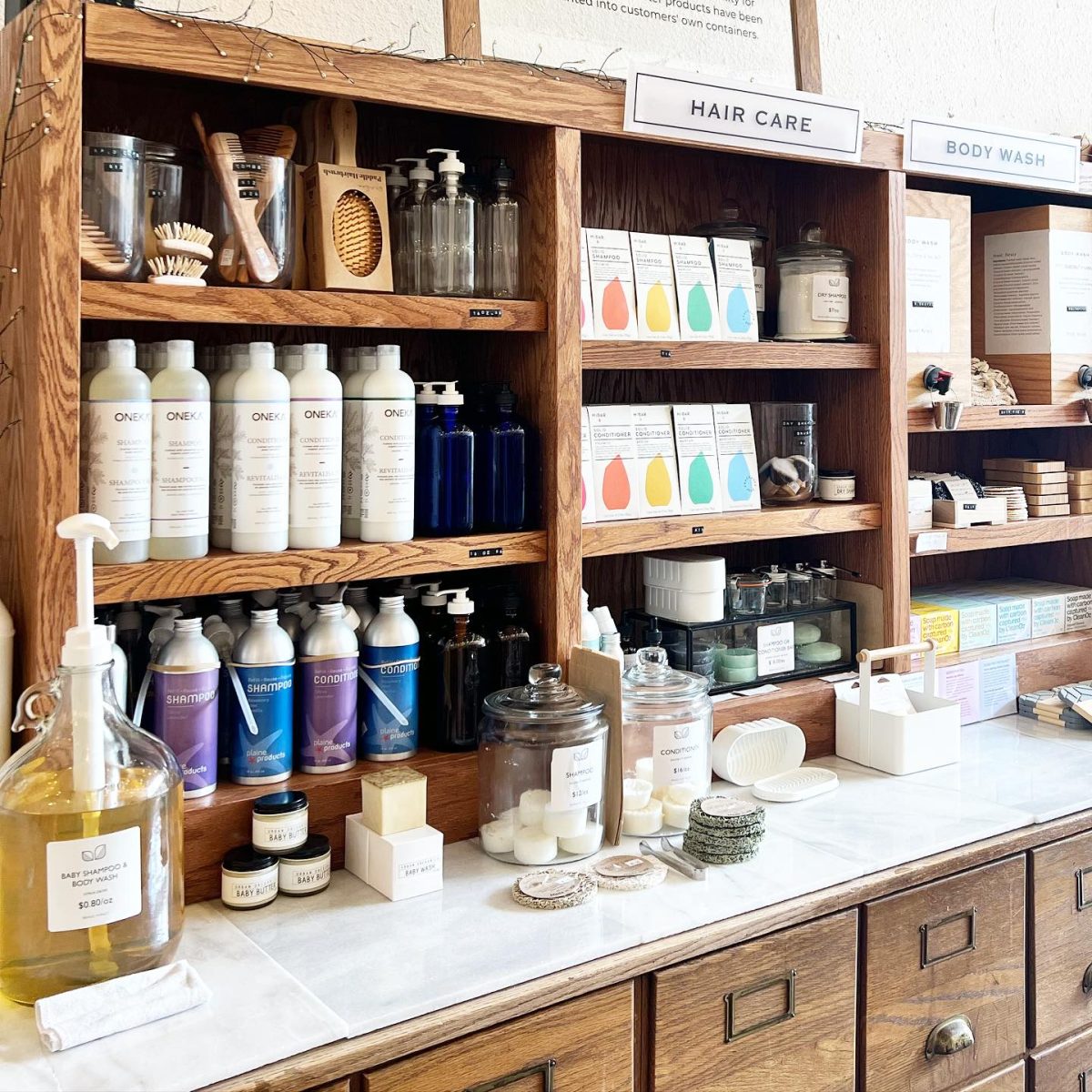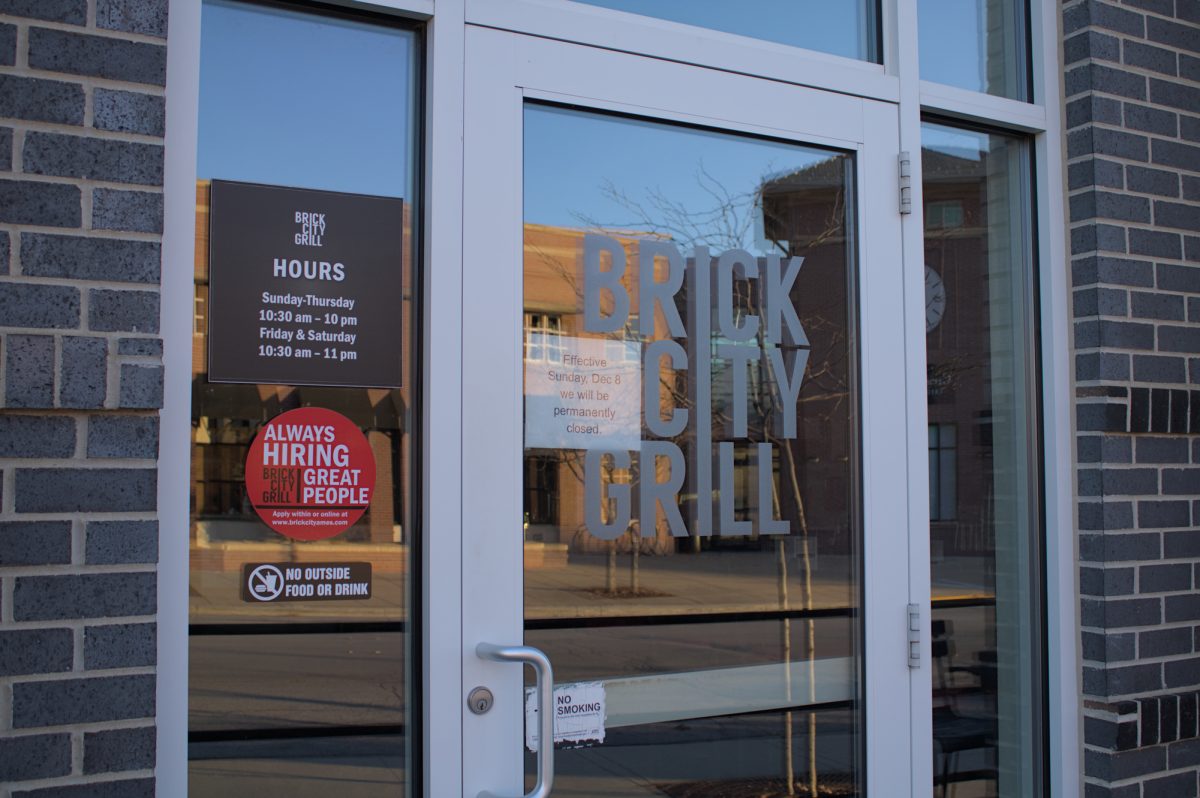If students are on a quest to make their daily routines more eco-friendly, one simple yet impactful place to start is right beneath the kitchen sink.
The benefits of eco-friendly and zero-waste cleaning products are being advertised more within stores looking to help consumers reduce their environmental footprint. More than ever, green cleaning products are available in stores at a comparable price to traditional chemical cleaners and non-reusable products.
As of this year, according to TheRoundUp, sustainable products have achieved a 32% share of market growth and products marketed as sustainable are currently growing 2.7 times faster than those that are not.
Merry Rankin, Iowa State’s director of sustainability, said many college students who are looking for convenience get dropped off at school with disinfectant wipes with no initial thought of how to clean with sustainability.
The majority of disinfectant wipes, including Clorox, typically incorporate either bleach or a group of chemicals known as Quaternary Ammonium Compounds. These are compounds with antimicrobial properties designed to eliminate harmful germs, but they also carry potential health hazards, including the development of conditions such as asthma, asthma attacks, allergies and disruptions to hormonal balance.
According to the Environmental Protection Agency (EPA), air pollution indoors is often two to five times higher than outdoors. Americans spend 90% of their time indoors. The choices of cleaning products, their ingredients and their environmental impact all demand attention according to Rankin.
“Anything that we put into our environment has an impact, so the consideration of products [and] what ingredients are in those products, the impact that each of those pieces can have on our environment, is an important consideration,” Rankin said.
Certain cleaning product ingredients, such as ammonia or bleach, can be harmful to both people and aquatic species when not properly treated before entering water systems, although according to the EPA, standard sewage treatment usually removes these constituents.
Iowa State’s Senior Manager in Custodial Services of Facilities Planning and Management, Michelle Lenkaitis, said it is common that certain terms such as “green” or “safe” are used for marketing purposes when the products really may not be the best thing to use or may not be safe for our environment.
There is no strict regulatory body or standardized criteria that defines what makes a product “green” or “safe” in the context of cleaning products. This lack of regulation allows companies to use these terms somewhat subjectively, potentially misleading consumers. Additionally, the use and disposal of a product can have a significant environmental impact, but this may not always be considered when products are labeled as “green.” For example, a product might be biodegradable, but the production process could be highly resource-intensive.
“I think that consumers need to become more educated,” Lenkaitis said. “That’s a big thing that we’re doing in custodial services is […] changing people’s perception of what is clean.”
Lenkaitis said a significant initiative within Iowa State custodial services involves a shift in their cleaning practices, and this, in turn, requires a transformation of people’s understanding of cleanliness. Product labels and ingredients are a key way for consumers to know if the product they are using is truly safe and environmentally friendly.
Green Seal, an environmental certification organization, works to protect human health, preserve the climate, minimize waste and ensure clean water. According to their website, Green Seal has taken a leading role in addressing the serious global health risks linked to per- and polyfluoroalkyl substances (PFAS) by instituting a comprehensive ban on approximately 12,000 PFAS in their certified cleaning and personal care products, going beyond regulatory limitations on PFAS restrictions.
Helpful products
Steve Kohtz, program specialist in Facilities Planning and Management at Iowa State, suggested a mix of white vinegar, water and dish soap, specifically Dawn, which he uses at home as a multipurpose cleaner.
Although promoted to help wildlife, Dawn dish soap includes pesticides, artificial colors and chemicals that are toxic and not eco-friendly, according to TheRoundUp. Alternatives include ECOS or Puracy dish soap.
One 64-fluid-ounce bottle of white vinegar is available for $2.50 at Walmart. According to the National Science Foundation, vinegar is about 5% acetic acid, which helps it break down the structure of some dirt, oils, films, stains and bacteria. According to Kohtz, the set time is longer for vinegar compared to a traditional cleaner, which is important to note as you must leave it on or scrub longer before wiping it away.
Vinegar is a natural acid, typically acetic acid, which can effectively clean and disinfect various surfaces. It is considered less toxic than many commercial cleaning products that contain harsh chemicals. Vinegar is biodegradable and safe to use around children and pets when properly diluted. However, it may not be suitable for all cleaning tasks, and it has a distinctive odor.
Baking soda, an ingredient most commonly used for making delicious desserts, can also be used as a cleaning product. According to Live Science, its high pH of nine, acidity and ability to dissolve sticky messes in the kitchen make it a sustainable and affordable product.
Baking soda, or sodium bicarbonate, is a mild abrasive and can be used to scrub surfaces without scratching them. It’s non-toxic and safe for the environment. Baking soda can also help neutralize odors. It’s a versatile and safe cleaning agent for various household tasks.
It serves various purposes, such as rust stain removal, fabric cleaning, kitchen countertop wiping and even deep oven cleaning. Furthermore, when placed in your fridge or freezer, it absorbs odors.
Harmful products
Multi-purpose cleaning products have the potential to cause skin, eye, nasal and throat irritation. Ingesting them can be extremely toxic. For example, disinfectant wipes, among other products, include chemicals which can irritate such areas. Additionally, certain chemicals in these products give off a fragrance that can entice animals and lead to poisoning as well, according to the EPA.
Some ingredients and pollutants in cleaners to avoid according to Fragile Earth include:
- Ammonia
- Ethylene glycol monobutyl ether acetate
- Sodium hypochlorite
- Trisodium phosphate
Rankin said to be mindful of the use of volatile organic compounds (VOCs), chemicals in cleaning products that pollute the air around us. Looking at the Design for Environment certification, implemented by the EPA, is another way to ensure your product is safe and eco-friendly.
Cleaning products containing VOCs have the potential to impact indoor air quality while also playing a role in the formation of smog in outdoor environments.
“I think sometimes when we hear about the environment, it’s a very global term and it’s intimidating to think about what we can do, but we are very powerful as individuals,” Lenkaitis said.
Zero waste
One highly used item is the paper towel. Used for cleaning spills, dusting, drying your hands and general cleaning, paper towels contribute to the mass consumption of trees every year.

“I just bought some paper towel replacement [reusable] cloths. My husband was convinced they actually even did a better job,” Rankin said.
Rankin explained there are many products that cater to the environment available if one is willing to look for them. She said putting reusable rags in the dishwasher when you run it to clean and sanitize them is an easy way to save time and energy.
“There are products [on the market], so we should really consider the convenience of something versus what the final outcome might be for our environment,” Rankin said.
Bringing refillable containers to stores such as Z.W. Mercantile in Ames is one way to reduce the use of plastic and paper that comes along with buying detergent and conditioner.
“The only drawback I could see would be cost-prohibitive goodness, but if you’re able to get your cleaning products in bulk, like you can at Z.W. [Mercantile], that can really help save a lot of money and then actually be on par with a lot of the stuff you could buy at a big grocery store,” said Elizabeth Smith, a graduate student in community and regional planning and sustainable agriculture at Iowa State.
Smith worked at Z.W. Mercantile from October 2021 until August 2023. Smith said the lack of chemicals within their eco-friendly and zero-waste cleaning products is the biggest advantage.
“They [the products] are made with ingredients that don’t include chemicals and are better for you and the planet than if they go down the drain and get into the waterways,” Smith said.
Z.W. Mercantile offers other sustainable products, such as dryer balls used every laundry drying cycle instead of using dryer sheets. Washable sponges, eco-friendly dishwasher pods, all-purpose cleaners and recycled toilet paper are all available for sale at this store and many other zero-waste shops.
Dryer balls, usually made from materials such as wool or rubber, offer reusability, making them both cost-effective and eco-friendly compared to single-use dryer sheets. They are an eco-friendly alternative devoid of harmful chemicals, making them a sustainable choice. They are also hypoallergenic, making them a suitable option for those with sensitive skin or allergies, as they don’t emit fragrances or chemical residues like dryer sheets sometimes do.
“I definitely learned a lot about ingredients to look for and ingredients to avoid just through conversations with customers and then product research to be able to talk to customers about why [certain products] would be a good option,” Smith said.
Rankin said as consumers, you have control over how you clean, the products you choose to buy and the waste that comes from that cleaning process.
“Change starts with every single one of us making our individual commitment and doing those things and making that difference within the areas that we personally have control over,” Rankin said.








